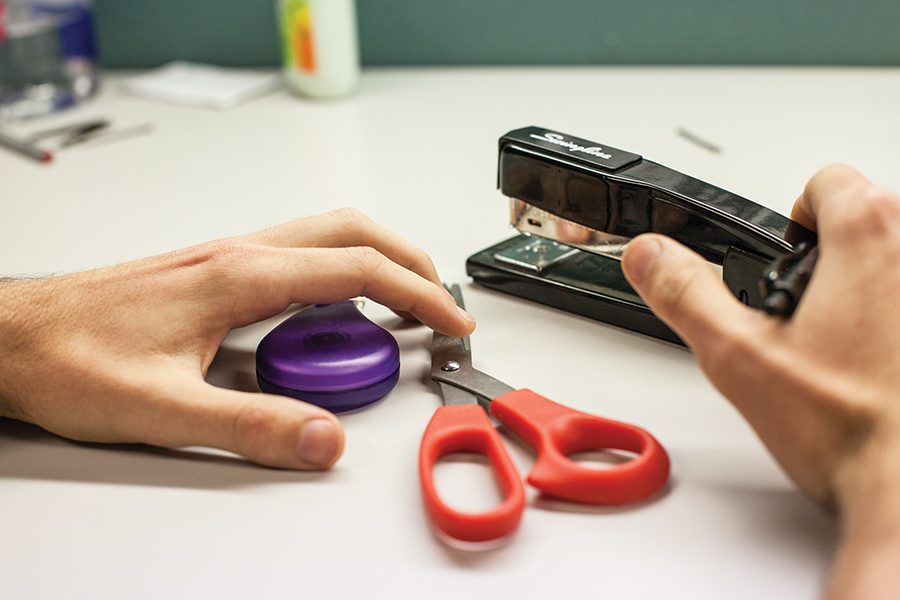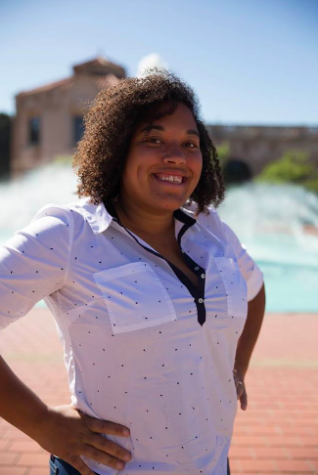A new California State University program with Staples Business Advantage now automatically substitutes office supply orders with with “sustainable” options when available.
The new plan, which went into effect Nov. 13, affects all office supply orders from San Diego State and other CSU campuses through Staples — the primary supplier for the CSU. As long as an equivalent is available, Staples will notify the purchasers of the substitution, but it cannot be overridden, according to a CSU document.
Items that will be substituted under the new program include facial tissues, paper towels and printer paper made from recycled materials; scissors made from recycled stainless steel; mechanical pencils made from 65 percent pre-consumer recycled materials; keyboards made from 70 percent pre-consumer recycled materials; and pens made from recycled water bottles.
During a sustainable business panel organized by the E3 Enviro-Business Society on Nov. 7, Tom Abram, facilities assistant director for sustainability, talked about the new program and some of the other ways that SDSU is working to become more environmentally friendly.
E3 Co-President Travis Freeman, sustainability senior, said he became interested in working toward a career in environmentally-friendly business practices after taking sustainability classes in high school. He said the new CSU program falls into line with his beliefs that changing the system that businesses operate in makes it easier to make sustainable choices.
“Basically our infrastructure of business and economics is based on market failures, and businesses that are supposed to be wasteful because it’s more profitable for them by externalizing most of their costs,” Freeman said. “(The auto-substitution program) goes with what I believe in, where you have to change it from the infrastructure within so that you don’t even get the option to not be sustainable. That’s really important to make it so that people don’t even have to think before making the sustainable decision.”
Drew Keske, sustainability senior and co-president for E3, said that he could see the new program inspiring other colleges in the state.
“I think it can really set a precedent not only just for other campuses and maybe the (University of California) system,” Keske said. “We can show that it’s feasible, sustainable and economically viable all in one.”
Aside from the new substitution program, Abram highlighted a portion of about 120 actions that he said the university hopes to take in its effort to become a carbon-neutral class by 2050.
Currently, solar panels on SDSU’s campus can generate up to one megawatt of energy under full sun exposure, Abram said.
The university has room for up to five megawatts of solar panel energy production, he said.
“I really want to see radical reductions in emissions, showing us that we are actually making progress,” he said. “That’s going to take some pretty aggressive energy efficiency efforts, which we are starting to do. We do have an evolving loan fund for energy efficiency projects that save energy — the energy savings go back in the fund so we can do more projects.”
Aside from energy production, SDSU is considering the impact of commuter vehicles as part of its sustainability plan. SDSU’s climate action plan says 30.8 percent of the university’s carbon footprint is a result of student commuting habits.
According to a survey cited in the plan, 54.4 percent of commuter students at SDSU travel to campus in single occupancy vehicles. These commuters travel an average of 10.7 miles each way, 4.72 times each week.
Expansion of campus housing is being encouraged to help diminish emissions in the region by decreasing travel distance for students, and Abram said that supporting alternative modes of transportation is another aspect the college is working on.
“We’re also encouraging people to get out of their cars,” Abram said. “Who knows how people are going to come to campus in 2050…I’d like to see a culture shift on campus where people are actively talking about climate.









